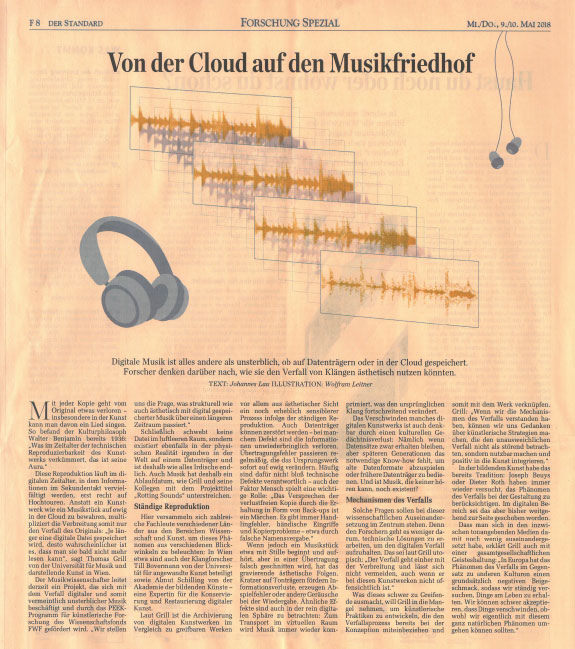Search Results for: thomas grill
Librarian’s Choice, MDW, March 13
Thomas Grill represents the rotting sounds project at the panel discussion “Ungehörtes – Unerhörtes” (unheard – unheard of), featuring archival sound documents of the library of the University of Music and Performing Arts Vienna.
March 13, 6pm
University library, reading room
Anton-von-Webern-Platz 1, 1030 Wien
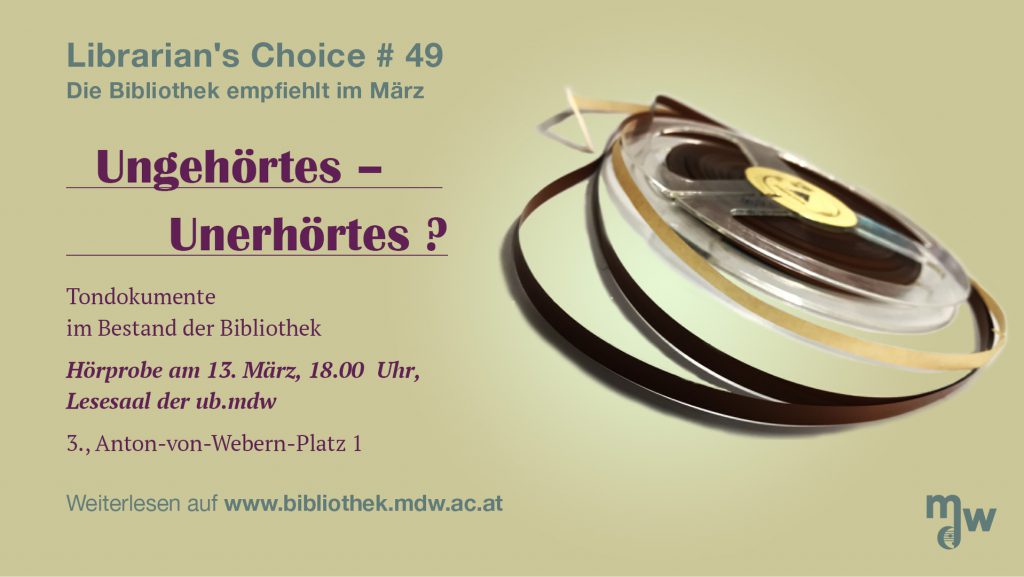
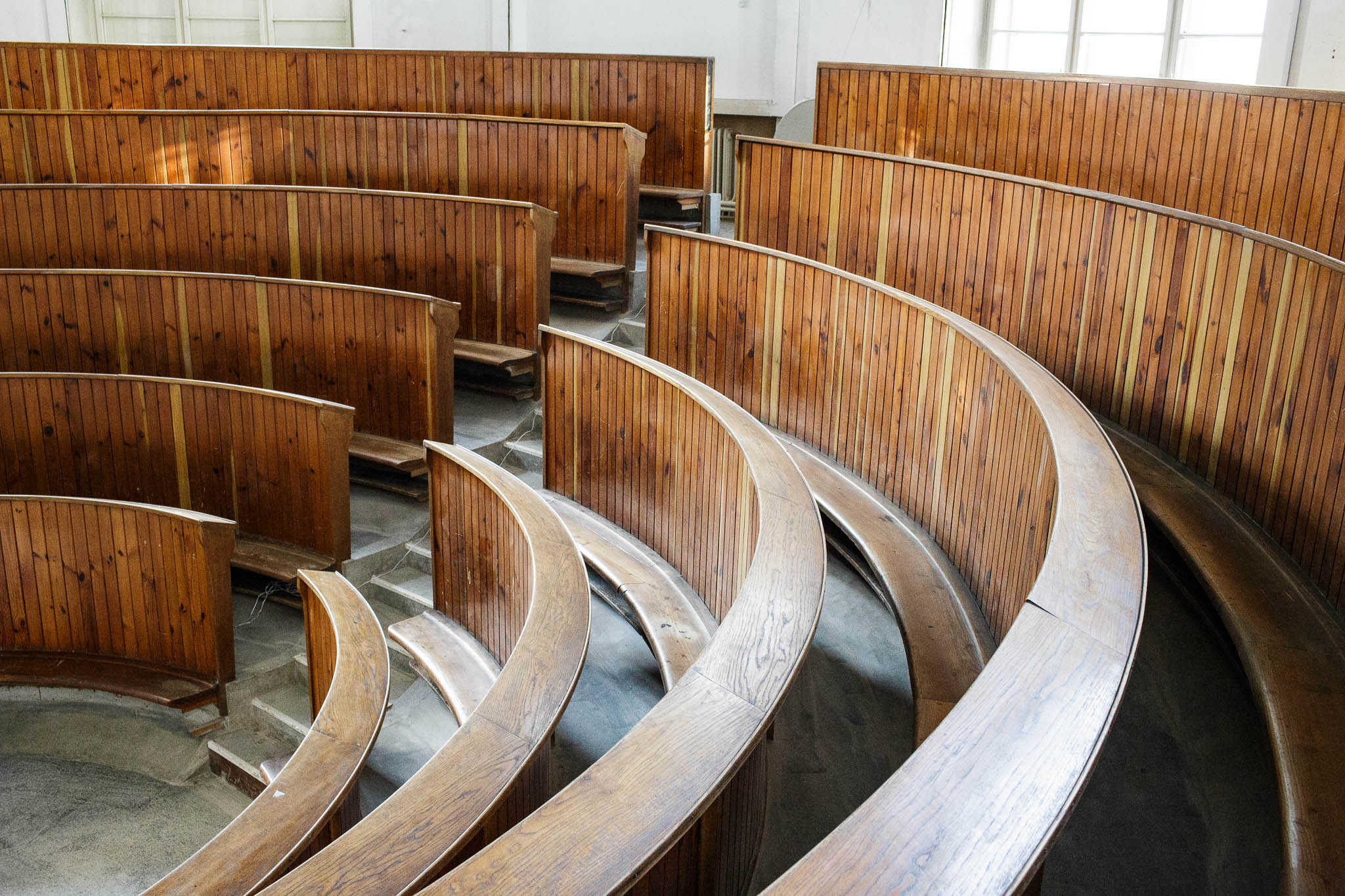
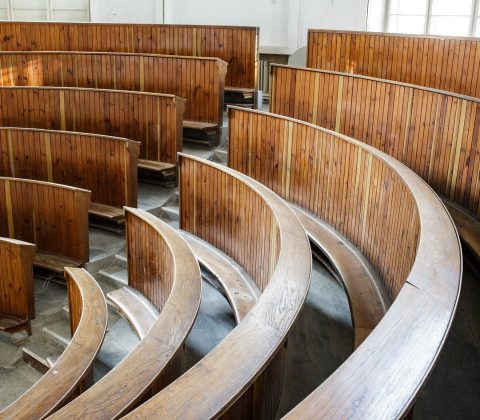
Opening of the Auditorium of rotting sounds, March 29, 6pm
Program:
Reinhold Friedl: Die Suche nach dem Original: vom Verfall elektroakustischer Musik – lecture
Klaus Filip: Sonic Dust – opto-acoustic performance
Till Bovermann: Buffer manipulations – live coding performance
Mario de Vega: Suspension – for quadraphonic system, tape, objects and self-made electronics
at the Bankettsaal of the University of Music and Performing Arts Vienna
Anton-von-Webern-Platz 1, 1030 Wien, Austria
The Auditorium is open after 7pm with the following works on display:
Angélica Castelló: Magnetic Room – objects and sound installation
Klaus Filip: Dust a bit – opto-acoustic installation
Juliana Herrero and Thomas Grill: Antenna – sounding object
Martin Howse: Enrichment and depletion – installation
Nicole Krenn and Thomas Grill: Fields of Haze – audiovisual installation
Tobias Leibetseder: Fragments – installation
Mario de Vega: Intermission – sounding object
Till Bovermann and Almut Schilling: CD-R(ot) – sound installation
… and other works and experimental setups of the project team Thomas Grill, Till Bovermann and Almut Schilling.
Live events in the Auditorium during the opening:
Angélica Castelló: Magnetic litany – Performance
Charlotta Ruth: Intervention
Dario Sanfilippo: Phase transitions – Multi-channel electroacoustic performance
For a visit of the auditorium at the opening a personal registration is absolutely recommended!
Workshop with Martin Howse and Till Bovermann on circulation/corruption:
28.3., 10:00 to 17:30 and 29.3., 09:30 to 13:00
at the Senatssitzungsraum (AW L0123) and the whole campus.
The rotting sounds project is a cooperation between the University of Music and Performing Arts Vienna, the University of Applied Arts Vienna and the Academy of Fine Arts Vienna, funded by the Austrian Science Fund (FWF).
Call for participation: Workshop “sound-material-time”, November 8+9, Anton Bruckner University Linz
We will host the workshop “sound-material-time”, taking place November 8+9, 2018, at the Anton Bruckner Private University, Linz, Austria.
We are specifically targeting practitioners and theorists in music / sound art explicitly working with long time spans / obsolescence phenomena / explicit degradation.
In principle also other forms of time-based art are welcome if they are topical. Our focus is on digital media, but deviations are possible.
Since the workshop is within our artistic research project “rotting sounds”, its intentions should well resonate with your topic.
We would like to stress the fact that this is not a scientific workshop, but rather a gathering where we would like to discuss (personal) artistic practices and their contexts.
Central concepts are the following:
- Interaction of material (physical, analog, digital) and time
- What is “digital”? Where do physical and logical data interface?
- Identifying and working with degradation processes/artifacts in the (digital) medium
- What is the aesthetic impact of such processes?
- Aspects of presentation, preservation, distribution of artworks depending on degradation
Each of the participants should bring along material things of their work practice which could be instruments, data carriers, objects of interests and passion. You should also give a short introduction about this practice.
Our intention is to keep the number of participants low (select 5-8 or so) and to zoom in on each practice individually.
All three core members of the research project will be present (Thomas Grill, Till Bovermann and Almut Schilling).
Within the group, we will develop questions and experiments on deterioration specifically for each participant.
We will also ask the participants prior to the workshop about specific topics they would like to have addressed.
The work schedule is 10am-1pm and 2pm to 5pm on both days, tentatively.
There will be a possibility for public presentation (concert format) in the evening of November 9.
The deadline for applications is Sunday, October 21, 2018.
Participation is free of charge.
Please direct your applications to info@rottingsounds.org, including
- a CV
- a few relevant examples of your work (artistic or theoretical)
- a short motivation text about what you suggest to bring in and what you expect
Please distribute the call!
Auditorium of rotting sounds
Our research project is physically located at the main campus of the University of Music and Performing Arts Vienna, in the only unrestored building which used to be an auditorium of the former School for Veterinary Medicine.
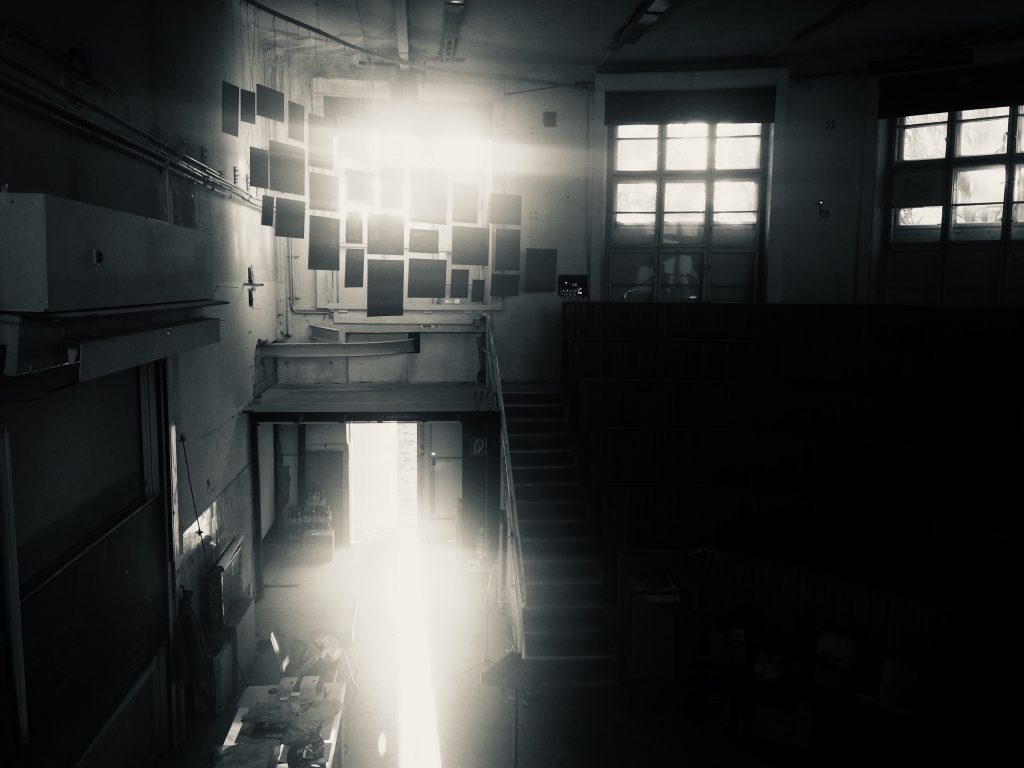
Address: Altes Auditorium, Anton von Webern Platz 1, 1030 Wien.
The building is the northern half-round element on the back side of building S on the campus.
We run our own project-related experiments with sound and media in this room, but it is also a publicly accessible listening space. We integrate external artistic positions which are related to our research agenda, that is, working with digital sound and time-dependency.
Conceptually, we refer to the legendary Mold museum (Schimmelmuseum) by artist Dieter Roth. Roth is well-known for his works with (bio-)degradable art and established his Schimmelmuseum in 1992 both as a workplace and a museum for the produced works.
Currently, the following works are on display:
- Juliana Herrero and Thomas Grill: Antenna – sound installation
- Almut Schilling: The Carrier – experimental system
- Till Bovermann and Almut Schilling: CD-R(ot) – sound installation
- Klaus Filip: Dust a bit – opto-acoustic installation
- Martin Howse: Enrichment and depletion – installation
- Nicole Krenn and Thomas Grill: Fields of Haze – audiovisual installation
- Hannes Köcher and Thomas Grill: Inscriptions from the Archive – processual installation
- Mario de Vega: Intermission – sounding object
- Tobias Leibetseder: Fragments – installation
- Angélica Castelló: Magnetic Room – objects and sound installation
- Thomas Grill: Midnight song – sound object
- Dario Sanfilippo: Phase transitions – sound installation
Currently exhibited at ESC Medienkunstlabor in Graz, Austria:
- Thomas Grill: Mutual understanding – sound installation
Details about the space, the works and the artists can be found in our exhibition catalog.
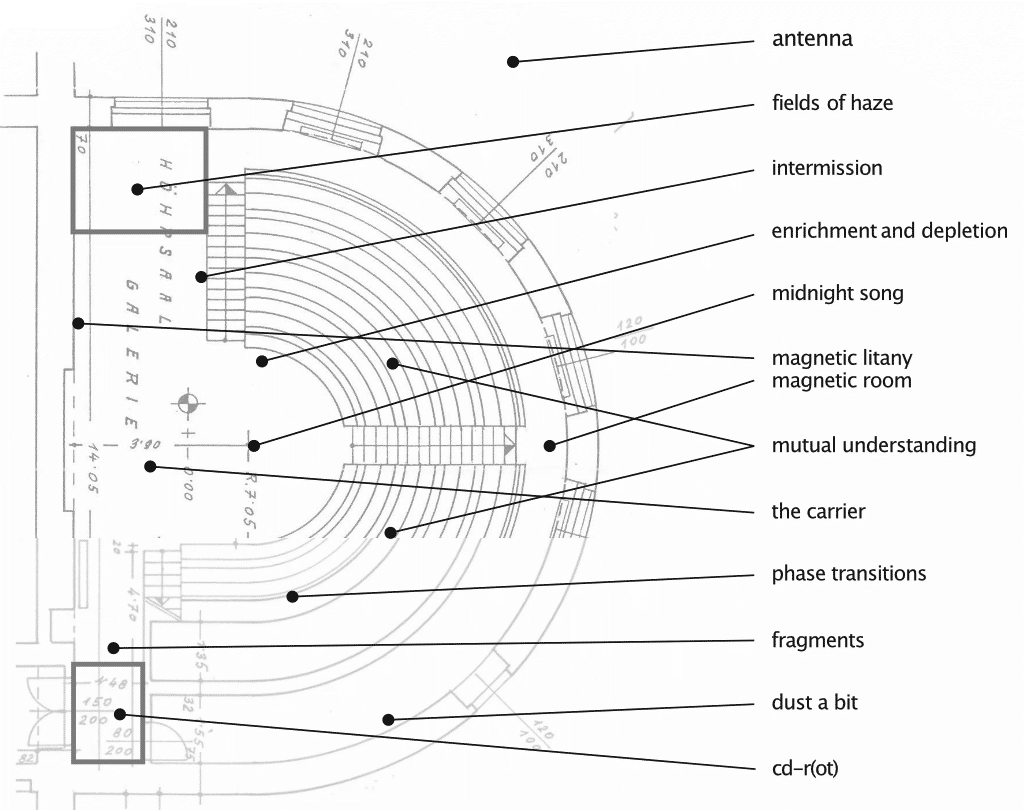
Due to the COVID-19 restrictions, the Auditorium can currently one be visited upon individual appointment.
Article in Austrian daily newspaper Der Standard, May 10
An interview by Johannes Lau with Thomas Grill on the rotting sounds project has been featured in an article of the Austrian daily newspaper Der Standard.
In Europa hat das Phänomen des Verfalls im Gegensatz zu anderen Kulturen einen grundsätzlich negativen Beigeschmack, sodass wir ständig versuchen, Dinge am Leben zu erhalten. Wir können schwer akzeptieren, dass Dinge verschwinden, obwohl wir eigentlich mit diesem ganz natürlichen Phänomen umgehen können sollten.
Presentation and discussion @ Applied Practice, AIL, May 2
Right after the official start with May 1, Thomas Grill and Almut Schilling will present concepts and strategies of the rotting sounds project as part of the Applied Practice lecture series, both from their respective angles of sound art and digital preservation.
Following will be an open discussion session led by media expert Michael Iber where the audience is cordially invited to share their thoughts on the topic with us. The talk will be in held in German language.
May 2 2018, 17h
Angewandte Innovation Laboratory (AIL)
Franz-Josefs-Kai 3, 1010 Vienna, Austria
Events
- 3.-9. July 2022: Adam McCartney’s and Thomas Grill’s joint composition “rill” will be presented as a piece+paper at the ICMC 2022 conference in Limerick, Ireland
- 14. March 2022: Online presentation of the Research catalogue exposition Fragments in time for the VIS #7 issue by Tobias Leibetseder and Thomas Grill.
- 8. March 2022: Short feature of Rotting sounds in the ORF Ö1 Radiokolleg series
- 11. January 2022: Lecture performance by Thomas Grill at Sweet Spot series, University Mozarteum and Paris Lodron University, Salzburg, Austria.
- 12. November 2021: Adam McCartney’s and Thomas Grill’s joint composition “rill”, part of the festival Wien Modern.
- 11. November 2021: Lecture by Almut Schilling at the Research Day 2021 at the Academy of Fine Arts, Vienna.
- 2. November 2021: Online talk by Thomas Grill at KTH Royal Institute of Technology, Stockhelm, Sweden.
- 8. October 2021: Opening of exhibition “oberhalb/unterhalb” at Stadtgalerie Waidhofen, featuring a fragment of fields of haze.
- 23.+24. September 2021: Rotting Sounds symposium at mdw – University of Music and Performing Arts Vienna.
- 1. May 2021: Opening of exhibition “Rieseln” in National Park Gesäuse‘s visitor’s center in Gstatterboden.
- 24. April 2021: Exhibition “Rieseln” at Nationalparkradio, Radio Freequenns, das Freie Radio im Ennstal.
- 9. April 2021: Presentation of Almut Schilling, Thomas Grill, Till Bovermann: Digital Patina at the SAR2021 artistic research conference.
- 21. March 2021: Voicings of an auralist at ORF Ö1 Kunstradio
- 16. March 2021: Book presentation Knowing in Performing with book chapter Voicings of an auralist
- 18. February 2021: Opening of “Mutual Understanding” at ESC Medienkunstlabor Graz, Austria.
- 17. January 2021: Thomas Grill featuring the installation mutual understanding at Art’s Birthday at Radio Helsinki.
- 1.-2. December 2020: International Faust Conference 2020 with Till Bovermann and Dario Sanfilippo at the Maison des Sciences de l’Homme Paris Nord.
- 26. October 2020: Performance of Low Frequency Orchestra (including Thomas Grill), Jerôme Noetinger and Wolfgang Mitterer @ Reaktor, Wien
- 9. October 2020: Panel discussion with Thomas Grill @ musikprotokoll, Graz.
- 8. October 2020: Performance “noise shaping” by Thomas Grill @ musikprotokoll, Graz.
- 11. September 2020: Performance “merge and dissolve” by Thomas Grill, Till Bovermann and Kathrin Hunze @ SOUND CAMPUS, ars electronica festival, Linz
- 21.-28. August 2020: Residency of Thomas Grill in National Park Gesäuse preparing next year’s exhibition at the visitor’s center in Gstatterboden.
- 20. May 2020: Performance evening at the Auditorium of Rotting Sounds: concert lecture by Stefan Fraunberger – postponed due to the COVID-19 crisis.
- 24. April 2020: Performance evening at the Auditorium of Rotting Sounds: duo Jérôme Noetinger / Thomas Grill – cancelled due to the COVID-19 crisis.
- 19. March 2020: Lecture by Thomas Grill at SAMA, University of the Arts, Helsinki, Finland. – cancelled due to the Corona virus outbreak.
- 17.-20. March 2020: Workshop by Thomas Grill at Aalto University, Department of Media, Helsinki, Finland. – cancelled due to the Corona virus outbreak.
- 6.-7. March 2020: Talk by Almut Schilling at the conference of the Austrian Restoration Association, Salzburg, Austria
- 26. February 2020: Poster presentation at the Klausur der Wissenschaften / MDW.
- 13. February 2020: Performance at Do Trans-Art, Salzburg, Austria.
- 17. January 2020: Rotting sounds @ Art’s Birthday, ORF Radiokulturhaus, Vienna, Austria
- 16. January 2020: Artistic Research Conference “Navigieren im Postdigitalen”. Soundframe @ AIL, Vienna, Austria
- 12. December 2019: Visit of the German Council of Science and Humanities (Wissenschaftsrat) at the Auditorium of Rotting Sounds.
- 4.+5. December 2019: Musical Materialities Panel, Masterclass and Performance at the University of Sussex, Brighton, UK.
- 16.+17. November 2019: Open Studio Days 2019 of the VIENNA ART WEEK. Auditorium open 15-18h.
- 2. October 2019: Performance evening “Fragments” at the Auditorium of Rotting Sounds
- 27. September 2019: Presentation at the European Researcher’s Night, University of Applied Arts Vienna.
- 7. September 2019: Installation “Mutual understanding” at the AI x Music festival, part of the Ars Electronica festival 2019.
- 27. June 2019: Opening of the UNDERSTANDING – ART & RESEARCH exhibition with our participation at the Museum of Applied Arts Vienna.
- 13. June 2019: Musical performance of Thomas Grill and Angélica Castelló at the Cassette Culture Node.Linz exhibition.
- 21.-25. May 2019: Talks, concerts and workshop at the New stage media lab and Herzen University, St.Petersburg, Russia
- 16.-17. May 2019: Mini-symposium on Heretical Sound Synthesis, University of the Arts Helsinki, Sibelius Academy, Helsinki, Finland
- 29. March 2019: Grand opening of the Auditorium of Rotting Sounds, University of Music and Performing Arts, Vienna, Austria.
- 28./29. March 2019: Workshop with Martin Howse and Till Bovermann at the University of Music and Performing Arts, Vienna, Austria.
- 22.–23. March 2019: Participation at the 10th SAR International Conference on Artistic Research at ZHdK, Zürich, Switzerland.
- 13. March 2019: Participation in panel discussion “Ungehörtes – Unerhörtes”, Library of the University of Music and Performing Arts Vienna, Austria.
- 8. December 2018: Participation in the Event Instruments Make Play at WORM, Rotterdam, NL.
- 26.–30. November 2018: Participation in the Orpheus Research Summit in Ghent, Belgium.
- 28./29. November 2018: Talk and artistic intervention at the Forum Media Technology, University of Applied Science in St.Pölten, Austria.
- 8.+9. November 2018: Workshop “sound-material-time”, Anton Bruckner Private University, Linz, Austria.
- 31. October 2018: Performance of the electroacoustic composition residuals at re_composed, part of paraflows XIII, festival for digital art and cultures, Vienna, Austria.
- 8. September 2018: Talk and panel discussion at the symposium “.. under control of Music | Music under control of .. composing (in) digital worlds”, Ars Electronica festival, Anton Bruckner University in Linz, Austria.
- 1.–28. September 2018: Invisible Worlds Residency …and then we will see if we can be friends at Eden Project, Cornwall, UK.
- 14. August 2018: Talk at the isaScience conference in Reichenau/Rax, Austria.
- 8. August 2018: Performance at Silence London, London, UK.
- 16. May 2018: Talk at the Politics of the Machine conference in Copenhagen, Denmark.
- 11. May 2018: Kick-off open session at the University of Music and Performing Arts Vienna, Austria.
- 4. May 2018: Impulse talk at the panel “Artistic research as a bridge between the disciplines”, University of Music and Performing Arts Vienna, Austria.
- 2. May 2018: Talk and discussion at the Angewandte Innovation Lab, Vienna, Austria.
- 4. April 2018: Talk at the Artistic Research symposium, University of Music and Performing Arts Vienna, Austria.
- 27. February 2018: Poster presentation at the science conclave, University of Music and Performing Arts Vienna, Austria.
Contribution for the isaScience conference accepted
Thomas Grill and Almut Schilling have put forward a proposal termed “Libre tools and strategies embracing the temporal deterioration of digital audio” for the isaScience 2018 conference with the topic of “Participatory Approaches to Music & Democracy” in Reichenau/Rax to be held on August 10-14.
Our proposal has been accepted by the organizers and we are looking forward to presenting our perspective.
Abstract: Most of today’s media output is produced and stored in the digital domain. The efficiency as well as its ease of use, also in the arts, has led to an overwhelming abundance of data representing audio and video content.
The practice of a digital artist, specifically also a digital musician, is typically bound to a complex ecosystem of commerical hard- and software. End-of-life of one of the tools causes a chain reaction of obsolescence in the entire system, also necessitating the acquiry of new know-how.
On the other hand, published products of digital arts practice appear on media dependent on technological reproduction devices. The material embodiments as much as the logical formats of these representations are subject to deterioration over time, demanding perpetual actions of media migration for successful preservation.
The global accessibility of digitally stored media implies that it is not a scarce good any longer. The cost for the consumer is low, but so is the quality of the experience. The act of music listening has shifted from physically interacting with an audio sculture to subjecting oneself to an infinite succession of “tracks”.
Our project of artistic research “rotting sounds” investigates the causes, processes and ramifications of degradation and technological obsolescence within the domain of digital audio. The hypothesis is that by providing pertinent knowledge and respective means to encounter digital deterioration in a constructive fashion, the inevitable is no longer a source of irritation but rather an æsthetic benefit.
For this, we will put forward open technology fostering self-empowerment and independence for digital artists from commercial constraints. On the other hand, we will propose artistic strategies to work with the fleeting nature of digital data, especially exploring the qualities of ephemerality.
In the context of the isascience conference, we will outline some focal points at this early stage of our project. We hope to open up a discussion on the present condition of digital media arts, and about strategies for regaining control of artistic means of expression in the field.
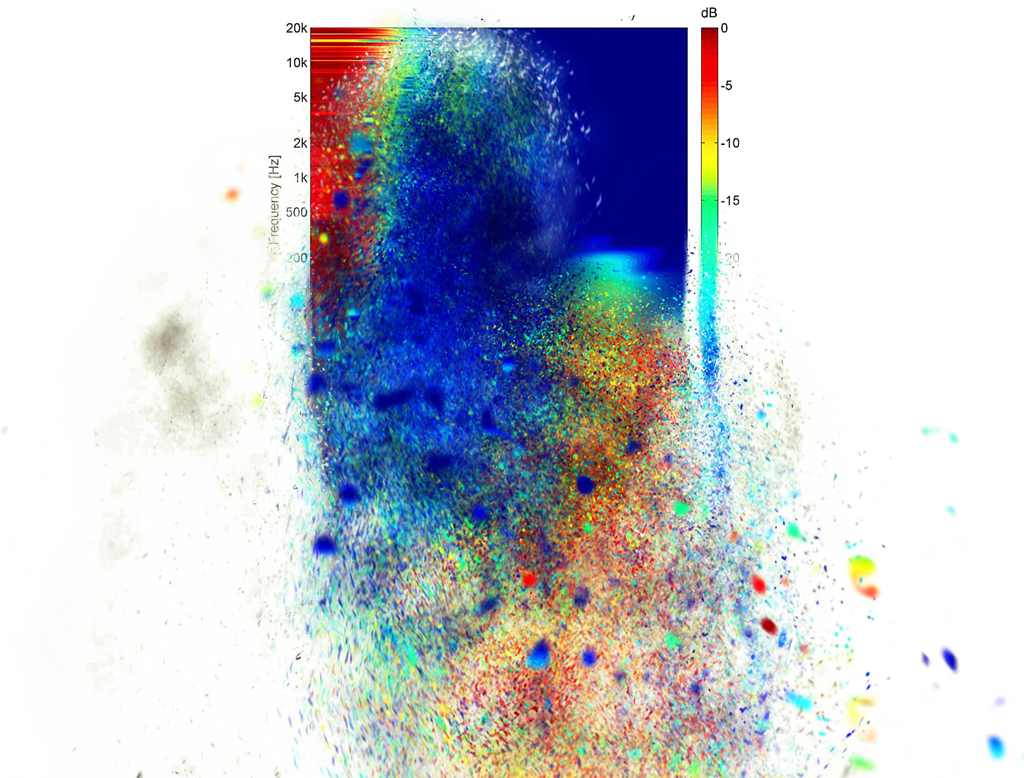

About
Rotting sounds – Embracing the temporal deterioration of digital audio
is a project of artistic research funded by the PEEK (Programme for Arts-based Research) funding program, managed by the Austrian Science Fund (FWF). The project AR 445-G24 is scheduled to run from May 2018 until the end of 2021.
Thomas Grill (University of Music and Performing Arts Vienna) is the project manager and principal investigator. He has ample experience in both scientific and artistic research and has been composing, performing and exhibiting with digital sound for over 20 years.
Till Bovermann (University of Applied Arts Vienna) is his main discourse partner. In his artistic works, Till addresses the relationship between seemingly contradictory elements, e.g., the digital and physical realm.
Almut Schilling (Academy of Fine Arts Vienna) covers the field of preservation of electronic and digital art and will collaborate on researching the principles of degradation.
The team interacts with a pool of technologists (Marije Baalman, Martin Howse, Martin Gasser, Nadja Wallaszkovits) who provide knowledge and develop tools and experimental prototypes, and with additional international experts (Reinhold Friedl, Andreas Rauber, Mario de Vega, Erich Berger) providing input and critical feedback.
Cooperation partners for workshops and presentations are the Anton Bruckner University, Linz, the V2 institute for unstable media in Rotterdam, and the Floating Sound Gallery in St. Petersburg, among others.
More information is available for download.
Most of today’s media output, be it audio or video, is produced and stored in the digital domain. Although digital data are adorned by the myth of lossless transmission and migration, everyday experience does prove the existence of degradation and, ultimately, data loss in various forms. This pertains to the physical nature of storage media and playback devices as well as to media formats and software in the context of their technological infrastructure. The project strives to elaborate on the causes, mechanisms and effects of such deterioration, specifically in the context of digital audio.
Since degradation cannot be avoided on principle, it is our general aim to unearth latent degrees of freedom pertaining to the artistic practice in the omnipresence of decay.How can degradation effects be understood, actuated, reproduced, directed and harnessed within sound art? Which are the mechanisms and implications of obsolescence concerning hard- and software? How can we model the process of decay in the digital domain, and what are its products and residues? What is the impact of the environment and human interaction? To which extent are artworks products of their material sources or their symptoms of decay?
To set up the project, we will conduct formal research on the fundaments and mechanisms of data degradation, and we will also organize five topical workshops in order to generate novel ideas and concepts. We will develop a low-level digital audio toolkit on which we will base our experiments on deterioration, potentially in all conceivable forms, pertaining to technical components such as data carriers, electronic circuits, algorithm logic and language, as well as to aesthetics and meaning in the form of musical content. A selection of experimental prototypes will be produced as artworks, and exposed to the public in the form of performances and exhibitions over long durations and/or in demanding environments. Written publications and a symposium will reflect on the concepts, results and repercussions of the project.
We envision our endeavor to function as a lighthouse project, deepening the awareness of largely unexplored properties of digital sound as a major component of contemporary art and prevalent technology. We hope to raise the conscience regarding the materiality, fragility and socio-economic contextuality of digital data in general by discussing and disseminating these topics in the broader artistic and scientific public. Our approach is basically inverse to a typical technological or scientific methods: Instead of researching means to overcome a commonly understood defect, we propose to recognize and integrate this defect, so that its potential damage is transferred into a benefit.
Contact
Contact us:
Post address:
Rotting sounds
Department of Composition, Electroacoustics and Tonmeister Education
c/o Thomas Grill
University of Music and Performing Arts Vienna
Anton-von-Webern-Platz 1
1030 Wien
Austria
